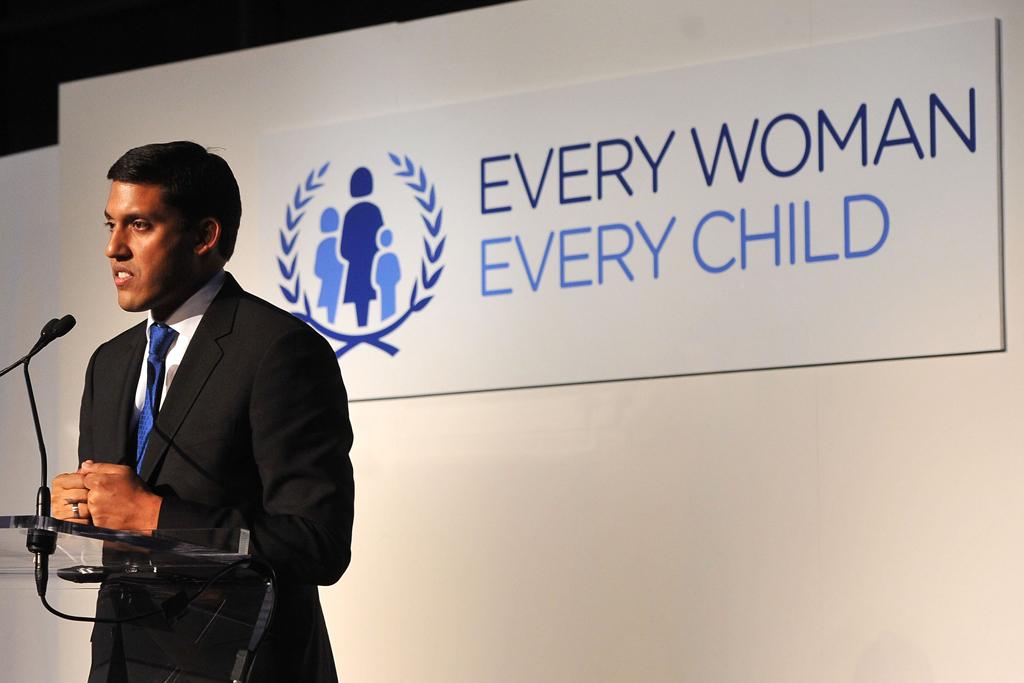Opinion: USAID gets results on reducing global child mortality
Rajiv Shah, USAID Administrator, speaks at the 2012 “Every Woman Every Child” dinner in New York.
Editor’s Note: GlobalPost Special Reports presents this guest post as part of a major global reporting initiative on children's health launching this summer.
WASHINGTON, DC — As reported in GlobalPost last week, the US Agency for International Development (USAID) released its first progress report examining how reforms enacted three years ago have strengthened the agency's relentless focus on results. One of the strongest examples of leveraging innovation and partnership is USAID's contribution to ending preventable child deaths.
USAID has played a vital role for decades in the development and delivery of low cost, high impact interventions to reach the most vulnerable children around the world. USAID is also the leader in supporting family planning, which enables women to have children at their healthiest times, so that both mother and infant are more likely to survive.
These long-term investments have been paying dividends. In the 24 countries where USAID has been heavily involved, maternal mortality declined by 40 to 65 percent. Under the President’s Malaria Initiative, 12 of the focus countries have had reductions in childhood mortality rates, which ranged from 16 to 50 percent.
In 2012, US-supported family planning programs abroad served 25.1 million women and averted 7.5 million unintended pregnancies. Between May 2009 and May 2012, targeted US nutrition programs reached nearly 9 million children in developing countries. And, together with other donors, the Obama administration’s $450 million, multi-year commitment to the Global Alliance for Vaccines and Immunizations (GAVI) will help save four million children over the next five years.
Building on these results, last year the United States joined with the governments of Ethiopia and India, in coordination with UNICEF, to host a Call to Action to end preventable child deaths. The more than 700 government, civil society and private sector participants who gathered for the Call to Action reaffirmed their commitment to child survival, leveraging the success of the many partnerships within and beyond the field of health.
The work ahead will take years of partnership, innovation, and priority-setting. Committing to Child Survival: A Promise Renewed emerged from the Call to Action as the sustained effort needed to mobilize a global coalition. Under A Promise Renewed, several countries are already taking practical steps towards fulfilling their pledge to end preventable child deaths.
One area of renewed attention is to reduce newborn mortality, which now accounts for more than 40 percent of all under-five deaths. USAID is collaborating with a core group of agencies including WHO, UNICEF, the Gates Foundation, Save the Children, and the Partnership for Maternal, Newborn, and Child Health (PMNCH), to develop the first Global Newborn Action Plan.
The draft will be presented at the Global Newborn Health Conference in South Africa, April 15-18, of which USAID is a proud co-sponsor. This event will include specific consultation on sharpened plans in 14 countries. It is anticipated that the Global Newborn Action Plan will be formally launched later this year.
The conference will also bring together leading private sector companies who will consult on strategies for increased private sector engagement in newborn health. Experience will be shared from a successful public-private partnership, the Helping Babies Breathe Alliance (HBB), which addresses newborn asphyxia with simple tools and training, will share its experience.
Between June 2010 and December 2012, HBB trained more than 100,000 health providers and sold almost 100,000 resuscitators in 52 countries, almost half supported by USAID. Rigorous impact evaluation of 78,500 deliveries in Tanzania showed that implementation of HBB resulted in a 47 percent mortality reduction among newborns within their first 24 hours of life.
Other major preventable killers of children include malaria, pneumonia and diarrhea, which account for 36 percent of all child deaths globally. USAID implements simple and effective ways to prevent and treat these diseases in children, such as use of insecticide-treated bed nets, expanding community-level treatment, and promotion of products to make drinking water safe.
USAID is working with WHO and other partners to develop an integrated and coordinated global pneumonia and diarrhea plan that will be aligned with country-level action.
Technical assistance advances these national efforts. For example, in Ghana, USAID supported the scale-up of a private sector program to improve diarrhea treatment through the use of oral rehydration salts and zinc. As a result of this technical assistance, in 2012 at total of 16 million tablets of zinc were sold, a significant achievement given that zinc was not available in Ghana prior to 2012.
This is just a snapshot of USAID’s maternal and child health legacy. As USAID Administrator Rajiv Shah said in his 2013 annual letter, “We cannot address these challenges alone, but we can mobilize movements.” Progress through partnership is made every day, and USAID’s technical leaders look forward to continuing this important dialogue.
Every day, reporters and producers at The World are hard at work bringing you human-centered news from across the globe. But we can’t do it without you. We need your support to ensure we can continue this work for another year.
Make a gift today, and you’ll help us unlock a matching gift of $67,000!
